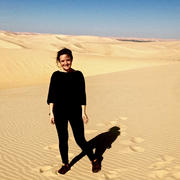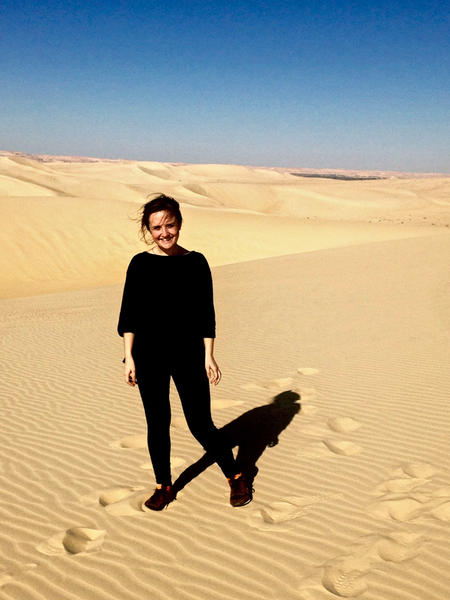
Chloe Bordewich is a PhD candidate in History and Middle Eastern Studies.
 How did you become interested in Middle Eastern studies?
How did you become interested in Middle Eastern studies?
In 2006, when I was 16, I went to Cairo for three weeks as part of a now-defunct State Department–funded exchange program for high school students called LINC (Linking Individuals, Knowledge, and Culture). My parents had told me they couldn’t pay for an expensive teen tour, but I was welcome to go anywhere I wanted if I found a way to pay for it. The friendships I made through LINC have been the bedrock of my social network in Egypt for the last 12 years, ensuring that it has felt like a second home even at the worst of times. As an undergraduate at Princeton, I fell in love with Arabic, spending my first summer of college studying it in Morocco. I majored in Near Eastern studies and in January 2012 returned to conduct field research for my senior thesis on the historical consciousnesses of the ongoing revolution. I moved to Cairo five months later to spend my first year after college as a fellow at the Center for Arabic Study Abroad (CASA). Though I later spent two years working in the field of international election observation and human rights, that year in Cairo at a historic moment—sandwiched between the first free elections in Egypt’s history and a military coup—excited me about the possibility of pursuing a PhD in Middle Eastern history.
Why did you choose CMES?
Having majored in an area studies department as an undergrad, I saw the value of being surrounded by people using other disciplines to answer similar questions about the same places I was studying. But I also regretted not having a strong disciplinary training, and I wanted this as a scholar. The History and Middle Eastern Studies PhD program offered both. I am able to be equally a member of the History Department and CMES communities. CMES is tight-knit and personalized—a boutique experience. And as a member of the History Department, I was encouraged to take courses and exam fields beyond my regional subfield. As a result, I think I am better equipped to frame my research so as to speak to readers outside Middle Eastern studies, to use methodologies developed by other kinds of historians, and to highlight why the history of the Middle East should matter to everyone.
What are your research interests?
I’m in the process of developing my prospectus now, but broadly speaking I’m interested in the nexus of information and power in the late and post-Ottoman Arab world, especially Egypt. Freedom of access to information has taken center stage since the beginning of the Arab uprisings in 2011, in recognition of the fact that lack of access to basic information about how one’s government functions has an incredibly corrosive effect on society and especially on the ability to mobilize sustained challenges to authoritarian regimes. Though I fully expect it to change when I’m in the field, my current plan is to write about human intelligence gathering in khedival Egypt (late 19th and early 20th c.), within Ottoman and, later, British imperial contexts. I ask what that can tell us about the formation of the state, but I’m also particularly interested in institutions’ broader impact: how they shape the ways people interact both with the state and with each other, particularly in terms of making and eroding social trust.
I’ve also been working on a project related to cartography in Egypt from the 1920s to 1970s. In this case I’m interested in moving beyond postcolonial theory to examine concretely the transfer and transformation of knowledge during the extended period of decolonization. What happens to knowledge gathered by and for the purposes of a colonial state once a colonizer leaves?
It’s important to me as a historian to speak to our own society, helping us better understand a region about which we have so many misconceptions and, I hope, shedding light on our own present moment of anxiety about truth, trust, misinformation, and surveillance. But I’m also aware of the legacy of Western scholars’ misappropriation of information gathered in the field, sometimes construed as spying, and the inequality of access to sources and to resources that privileges us over Arab historians (for example) in studying Arab history. So I also feel it’s important to write something that can be useful to the society about which I’m writing, not only to our own.
What do you like best about studying at Harvard?
It’s frustrating at times that there aren’t more faculty at Harvard in my field. But a silver lining is that students in Middle Eastern history are resourceful, uncompetitive, and supportive of each other. It’s not a crowded space, and everyone helps each other out. CMES, in particular, is also very supportive of our travels. There is recognition that going abroad for language study and research, even at the preliminary stage, is crucial for developing relevant and meaningful projects—especially because we are working in a region where archival access is heavily restricted and building trust with the institutions where we will conduct our dissertation research is essential.
What do you like best about living in Cambridge?
Cambridge is a highly walkable, friendly place to live with all the cultural benefits of a big city. It’s great to be able to stop working and head to the Palestinian film festival at the MFA, catch a night of Ottoman theater, or, the highlight of my fall semester this year, see the Egyptian comedian Bassem Youssef perform standup comedy in Boston.
What travel/research opportunities have you pursued during your time at Harvard?
My first year at Harvard coincided with the inaugural CMES J-Term trip to Tunisia, on which I learned how to eat a brik, saw the Great Mosque of Kairouan, and explored the Tunisian National Archives. That summer, 2016, CMES supported my first foray into studying modern Turkish, at an intensive language institute in Istanbul, as well as preliminary research in London and Cairo. While in Turkey, I also taught English at a cultural center for Syrian refugees, Ad Dar, where I found a wonderful and welcoming community. During J-Term 2017, I returned to Cairo for three weeks to research the history of Egyptian cartography, and in summer 2017 I was an ARIT fellow studying advanced modern Turkish at Boğaziçi University in Istanbul. The two summers of Turkish helped me develop the proficiency I needed to begin Ottoman Turkish coursework at Harvard.
What extracurriculars have you pursued?
I’ve served as a representative of my cohort in the History Graduate Students’ Association each year. Just after the 2016 presidential election I organized a popular event called “Between the Archive and the Public Sphere” with CMES Shawwaf Visiting Professor Khaled Fahmy and two history faculty to discuss how we can make an impact, as historians, outside academia, through activism, the judicial system, or other channels. I help coordinate the Middle East Beyond Borders workshop and am a fellow of the Science, Religion, and Culture program at the Divinity School. I’m also involved with the Middle East Refugee Service Initiative, which works to make refugees from Iraq and Syria who have been resettled in the Boston area feel welcome here, and sometimes volunteer for Arabic translation projects. I regularly meet with my Indivisible chapter, trying to remain politically engaged at the grassroots level.
What are your plans after finishing your degree?
This is a long way off! I really love teaching, and would like to find an academic job that values that. I’d also like to spend at least a few years teaching abroad, in the Middle East. Because of the nature of the tenure process here, that is often not seen as a realistic option, but I think I would learn a lot from students encountering their own history rather than someone else’s.
What advice would you offer a prospective student?
Don’t think too narrowly when considering the faculty with whom you’d like to work. Harvard encourages us to build relationships with several professors, not be “owned” by any single one. They don’t all need to be experts in the Middle East. Think about assembling a team each of whose members brings something to the table: subject matter expertise, professional mentorship, close reading of your work, or methodological creativity.
